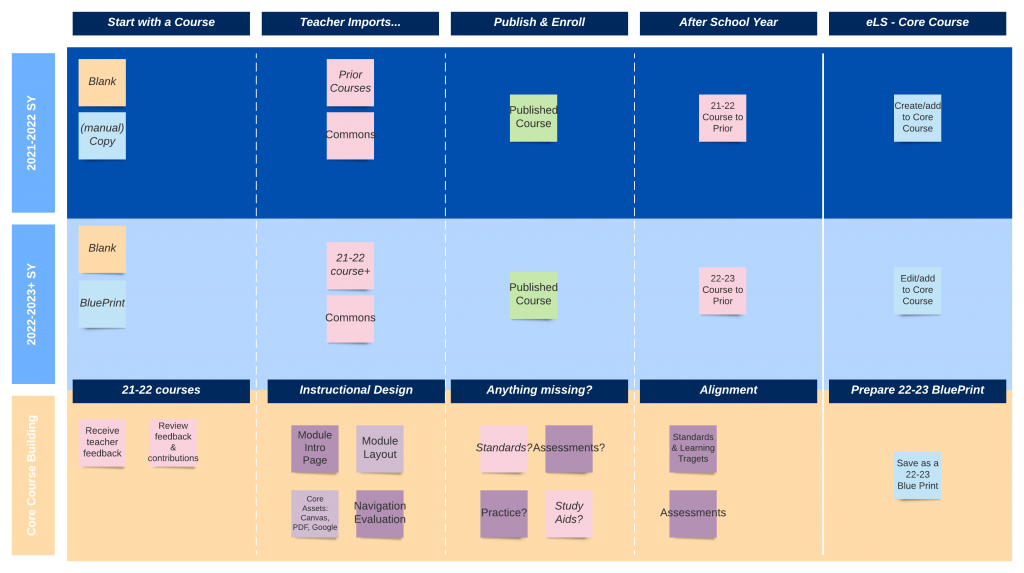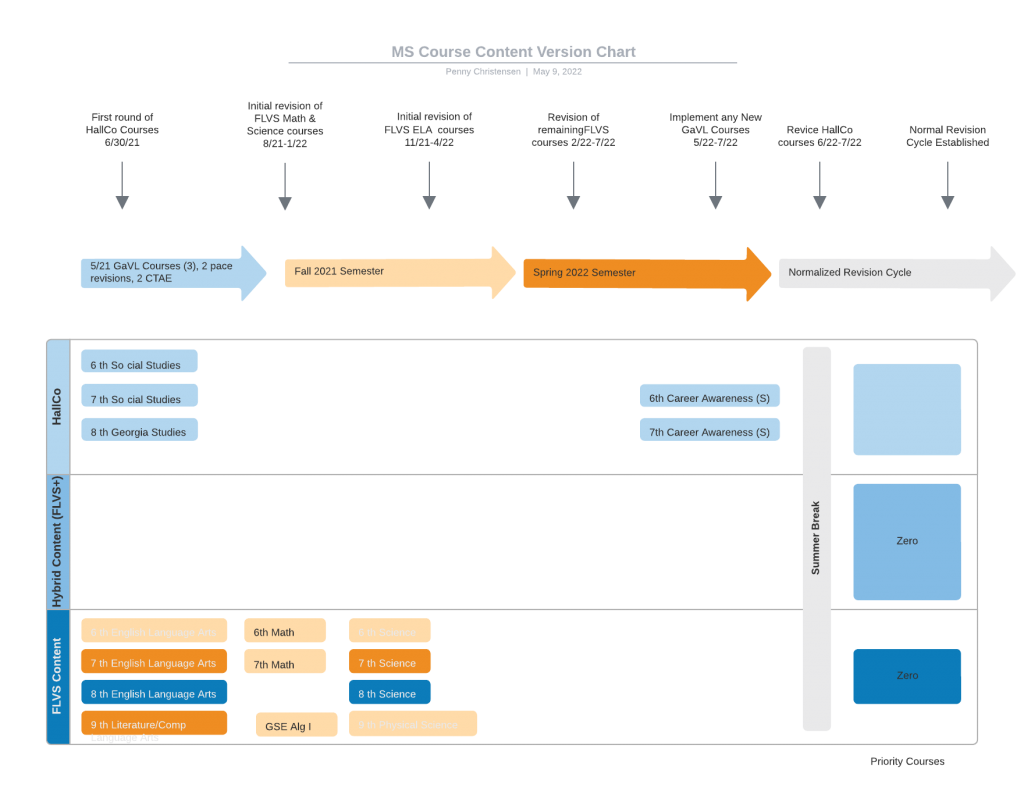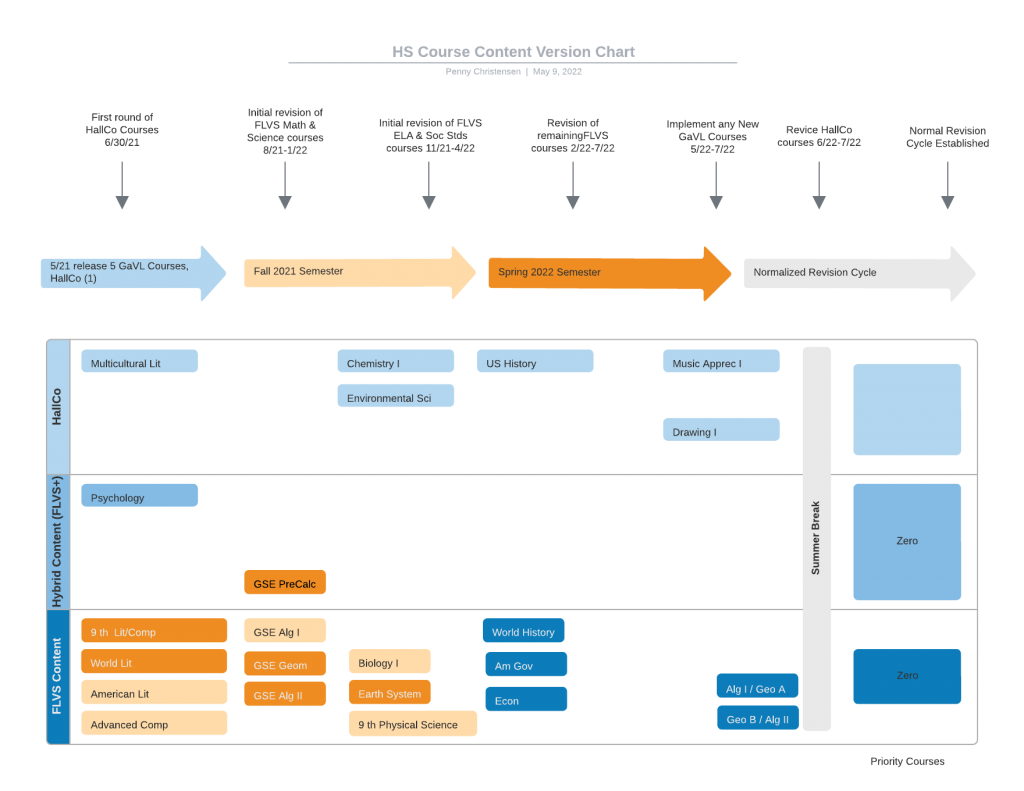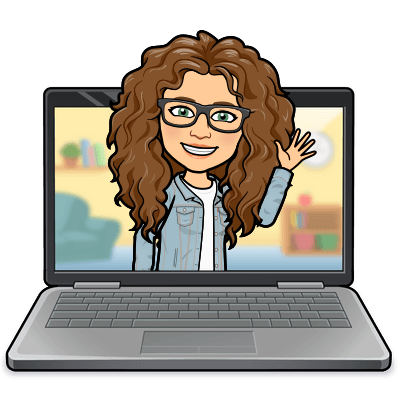Digital Portfolio
Click through for a Visual Introduction
Digital Portfolio
I joined the district eLearning team in 2009 and have provided comprehensive adult learning opportunities for teachers and staff through training and professional development. Since 2018, I have been the lead professional learning coordinator for eLearning in Hall County Schools. In this role, I negotiate, purchase, and customize professional learning opportunities with educational technology vendors. I initiated the district’s style guide for content creation and managed the substitute budget, ensuring alignment with school and department goals in collaboration with school leadership and district departments.
I have been blogging since 2010. My demonstrated expertise has evolved to specifically:
Before the COVID-19 pandemic, I developed microcredentials that attached measurable achievements to professional learning badges within a learning pathway. This initiative introduced adult learners to extended learning opportunities, validated acquired competencies, and facilitated professional development. My work transitioned from in-person to online formats during the pandemic.
During the onset of the COVID-19 pandemic, I assumed a leadership role in virtual teaching and course support. I built and facilitated an online professional learning course for district paraprofessionals, using our existing Microsoft account to create content that met the needs for documented professional learning hours. This course helped approximately 300 paraprofessionals gain professional learning credit and provided valuable instructional resources.
I also developed an asynchronous course within Canvas LMS, supporting teachers new to learning and teaching in an LMS. I provided on-request support sessions to address the needs of educators adapting to these new modalities.
Pandemic Digital Leadership
March - May 2020
To stabilize our workforce district-wide, I built and facilitated an online professional learning course for district paraprofessionals. When considering the range of K-12, the special education focus of our paraprofessionals, and the possible interest in career mobility I settled on using our existing Microsoft account to build and offer more information on what could be used in the classroom. I developed the Paraprofessionals Microsoft course in April and met the need for documented hours of professional learning while providing usable instruction to fellow educators. This content is where I discovered my preference for using GIFs as visual directions during this course. I helped approximately 300 paraprofessionals receive professional learning credit with this instruction on how to submit credit to their Principal. An alternative to delivering meals to students via the bus route was to participate in my learning opportunities. I met so many people who keep our schools running through this course!
Teacher professional learning opportunities I also offered included an asynchronous course created by Canvas LMS and facilitated by me within the district. I held on-request support sessions for this course, such as this May session. This was a way to reach those educators who never considered they would be required to learn an LMS and had not yet considered how to teach effectively in an LMS. I train on platforms from the ground up in this session.
June - July 2020
From June to July 2020, I prepared for the 2020-2021 school year by collaborating with the curriculum and instruction department to integrate Florida Virtual Learning (FLVS) courses. I recruited, trained, and supervised subject matter experts to identify and fill gaps in state standards within the FLVS courses. I coordinated the distribution and support for these courses, creating and leading pre-planning training sessions in Canvas LMS for over 400 K-12 teachers.
We contacted many of the identified virtual teachers at the end of the summer for extended preplanning. I created and led a distributed training in Canvas LMS over the extended three weeks of preplanning our district scheduled to launch the school year 2020-2021. I introduced my online teaching Pre-planning course for new online teachers at the pinnacle of their anxiety about their online prowess. Initial estimates grew exponentially from 200 to 500, and the average for the first semester was approximately 400 K-12 teachers. The expectations and support had to align to move these instructors confidently into place.
Throughout the 2020-2021 school year, I maintained documentation for 75+ courses, supervised course authors, and provided support through various communication channels. In Spring 2021, I advised on the developing a virtual program of choice, crafting a roadmap to transition from FLVS to Georgia Virtual Learning (GVL) content. I created revision cycle documentation and guided future course creators.
I maintained the documentation for each of the (75+) K-12 courses. The retention of the SME and course author contact for my reference and district payment was under my supervision. I maintained the master list of master courses and requested new blueprints for new teachers as they were assigned. And I provided timely answers to building and district leaders on the status of these courses.
August 2020
I provided Course Walks by grade band and content. Here is an example of a high school science course walk. These live sessions were held during the pre-planning for the school year 2020-2021, and I presented live and then offered an asynchronous course for those teachers experiencing this shift in teaching modalities. While that number constantly fluctuated, the first semester averaged 400 teacher-learners.
School Year 2020-2021
I coordinated this with my elearning workgroup colleagues who concentrated on the blueprint delivery of the courses via Canvas LMS along with ongoing contact with the curriculum and instruction presence in our district. As the primary support contact for many of these teachers, I worked to coordinate on-site support as needed for the neediest individuals. I introduced Microsoft Teams as a means of both a crowdsourcing opportunity for group wisdom and immediate support for myself; I supported via phone, email, Teams, and in-person meetings for the school year 2020-2021.
Spring 2021
As the school year concluded it was apparant this type of learning would not contract to pre-pandemic levels. The district invested in the idea of a virtual program of choice. I consulted on selecting future virtual teachers as a primary contact, knowledgeable of their skills and aptitude for the positions.
As an advisor, I crafted a road map overviewing the path from proprietary FLVS content to content based on Georgia Virtual Learning (GVL) “Skinny Courses” as I termed them. This process would retain user-friendliness for learners and their families, continuity of teaching and learning throughout the grade bands across teachers and contents.

I created Revision Cycle Documentation to transition away from the FLVS content we utilized during the height of the pandemic.


Based on the feedback from the instructors who constructed courses over the summer and those who taught the courses, I created a brief guidance document for future course creators of my proposed “skinny courses.” I used the Core Course Writers document for reference when onboarding potential course authors. Here is a sample of me providing Core Course Creation Fall 2021 onboarding to those electing to participate in creating courses.
Inside my District
With the knowledge that learning would not entirely contract to pre-pandemic levels, the district’s virtual program of choice needed to be built. I consulted on selecting teachers based on my experience as their primary contact, knowledge of their skills, and aptitude for the positions.
I created and facilitated an onboarding professional learning course on virtual teaching best practices. In the 2021 summer course for the incoming virtual teacher to the program of choice, I crafted one week/five days’ worth of investigation into online teaching and learning practices to facilitate discussion and drive philosophical agreement within the new workgroup. The organizing principle was the Community of Inquiry Model (Sanders & Lokey-Vega, 2020) and Hattie’s study of Effect Size (Visible Learning, n.d.). I included Fisher, Fry, and Hattie’s (2020) The Distance Learning Playbook as a practical desktop reference throughout the year. I started the professional learning with the Future Protocol from the School Reform Initiative with great “forecasting” outcomes for the new workgroup.
A New Challenge
After experiencing the importance of a strong digital trove of learning assets I sought a new challenge. In July 2022, I moved to a smaller district with high growth potential. This district wanted to transition to a learning management system and support existing school-based digital coaches in further technology integration. Since joining the Barrow County School System, I have supported a 1:1 initiative, led the 1EdTech implementation with a software approval process, and delivered an LMS from RFP to Implementation in under 8 months.
I created a two-year interdepartmental roadmap for the Learning Management System integration:

To inform scheduling, I created a Gantt Chart to track the time per LMS administration tasks:

The intention of these documents is two-fold. With documents such as this, implementing the learning management system is more transparent and inviting for collaboration. I refer to these two documents when scheduling other initiatives, contract discussions, and resource allocation. This is also made available to school leadership, the district leadership, and directed to teachers for their understanding, and buy-in, of the timeline. Also, I seek to model a transparent process and encourage stakeholders to monitor any changes.
Outside my District
Externally, I collaborated with Georgia Virtual Learning to adapt state-created courses for our LMS. I also consulted with district and virtual program teachers on efficient course-creation methods. Recently, I have been hired as an online teaching and learning expert consultant by Advanced Learning Partnerships and have contributed to industry events, such as the Learning Counsel panel discussion on reducing teacher workload. In the Spring of 2023 and 2024, I participated in an Educator Panel on Models, Workflow, and Change Management, alongside prominent educational leaders.
I worked with Georgia Virtual Learning to download a state-created virtual course native to our LMS (created using FLVS content). Another service I offered, was to walk district and virtual program of choice teachers through how to adapt these courses to their needs. I have outlined the most efficient course creations based on (1) state-provided courses, (2) district content, and (3) course creation from scratch.
Learning Counsel Panel discussions:
References
Backup of Hattie’s Ranking list of 256 Influences And Effect Sizes Related To Student Achievement. VISIBLE LEARNING. (n.d.). https://visible-learning.org/backup-hattie-ranking-256-effects-2017/ (Links to an external site.).
Fisher, D., Frey, N., & Hattie, J. (2020). The distance learning playbook, grades K-12: Teaching for engagement and impact in any setting. SAGE Publications.
Sanders, K., & Lokey-Vega, A. (2020). K-12 Community of Inquiry: A Case Study of the Applicability of the Community of Inquiry Framework in the K-12 Online Learning Environment. Journal of Online Learning Research, 6(1), 35–56.






Recent Comments